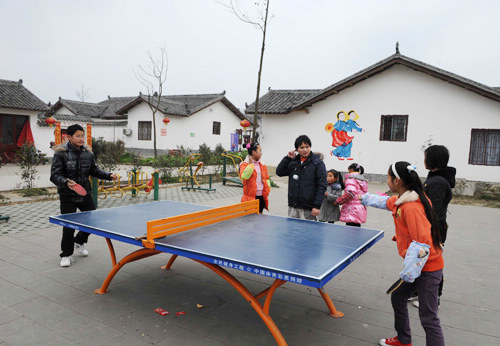|
 |
|
LIFE ON TRACK: Children play table tennis in a village in Mianzhu City, soutwest China's Sichuan Province, which was rebuilt after the Wenchuan earthquake in May 2008. Many NGOs participated in the post-quake reconstruction (XINHUA) |
On April 8, at a ceremony marking the first anniversary of the Free Lunch for Children program, Deng announced that the program had already raised 24 million yuan ($3.77 million) and sponsored 17,000 students.
On October 26, 2011, Premier Wen Jiabao said that the Central Government would allocate 16 billion yuan ($2.51 billion) worth of nutrition subsidies to village schools in 680 counties, but this does not cover children who attend preschool classes and teachers. Deng said that the Free Lunch for Children program would cover the latter group.
Both Deng Fei and the China Social Welfare Foundation shared the belief that they can achieve more through working in partnership.
"This is an important attempt to explore ways that a public foundation can be combined with a private charity program," said Miao Li, Secretary General of the China Social Welfare Foundation.
Breaking the ice
The cooperation between NGOs and public foundations used to be very rare. The ice was really broken following the 8.0-magnitude Wenchuan earthquake in southwest China's Sichuan Province in May 2008, which killed nearly 70,000 people and left millions of people homeless.
After the disaster, the Red Cross Society of China (RCSC) received over 1.3 billion yuan ($204 million) in donation but found it difficult to manage the money effectively by itself. On pilot basis, the society allocated 20 million yuan ($3.14 million) to 17 NGOs, which were selected through public tender procedures to help with 17 reconstruction projects.
The Shaanxi Women's Research Association got 1.45 million yuan ($227,776). As one of China's oldest and best known NGOs, the association was founded in 1986 and registered as a social organization in 1999.
The association used the money to build 36 buildings for quake survivors. More importantly, it developed three different types of low-cost temporary facilities to fit the needs of earthquake-affected areas.
An education-focused NGO, Student Action, began its relief efforts in the disaster area immediately after the earthquake. In the heavily hit region of Pengzhou, it provided schools with emergency lighting systems, lightning protection systems, electric fans and other facilities.
In order to meet the needs of bereaved and displaced children, Student Action, with 500,000 yuan ($78,470) from the RCSC, also set up a New Summer Life activity center in Pengzhou. With the help of university student volunteers, the center hosted fun interactive programs for local children, aimed at reducing the negative psychological impact of the earthquake and its aftermath.
On May 16, an evaluation report of the 17 projects was released in Beijing by the RCSC and the Center for Civil Society Studies of Peking University. The report says that 12 out of 17 projects prove to be successful.
"This has provided a model for cooperation between NGOs and governmentsponsored foundations," said Guo Changjiang, Vice President of the RCSC.
Challenges
According to the China Foundation Center, there are now 1,324 private foundations operating in China, 131 more than the number of public foundations.
"This means private foundations will inevitably cooperate more with government-sponsored ones," said Secretary General Yang of the Guizhou Youth Development Foundation.
"NGOs currently rely more on volunteers, whose executive abilities vary and this could cause some problems," said Liu Neng, a professor of Sociology at Peking University and also a member of the evaluation team on the 17 post-Wenchuan earthquake reconstruction projects by NGOs. "Besides, when they spread their programs to a new place, they tend to adopt the methods they used before despite the new environment. This may also negatively affect the programs' implementation."
Liu took an "unsuccessful" project out of the 17 projects for example. A NGO called Wild Grass from Chengdu, Sichuan, planned to build eco-friendly toilets for 150 rural households in the quake-hit area. But as they were not familiar with the local environment and couldn't communicate well with the local government, their project didn't proceed well.
"Both NGOs and government-sponsored foundations have their advantages, and we should combine the advantages together and make the cooperation work in a much more effective way," said Yang Tuan, Deputy Director of the Social Policy Research Center of the Chinese Academy of Social Sciences.
The Center for Civil Society Studies of Peking University suggested there should be a third party to supervise and evaluate such cooperation.
Email us at: yuanyuan@bjreview.com | 